#antye greie-ripatti
Explore tagged Tumblr posts
Photo
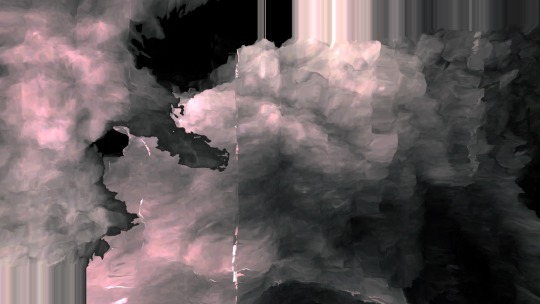
🔴 ON AIR - Today Tuesday 6 June 2023 at 7:00 pm (CEST) - usmaradio.org USMA for Radioart106 #𝟭𝟱𝟳_𝗥𝗘𝗖𝗢𝗡 𝘄𝗶𝘁𝗵 𝗔𝗚𝗙 [58 min]
methodologies of sounding. REC:on ⇢ a space {inflection} for political sound work & political listening ↣ derived from a compositional technology of ⥉ growing sound ⤹ growing connections ‡ ⁜ ⁂ ⁁ ※ growing networks ✸ #soundasgrowing - the piece explores, the listening space rec-on.org, sound and listening, critic and reflects sound practice. Listen to the current world and identify space for artistic positioning. What is political sound? What is collective sound? Does sound have a transformative quality? What is a sonic position?
Antye Greie-Ripatti AGF is an audio sculptress, composer and sound artist. Curator, facilitator of sound art, poemproducer & intersectional feminist networker. Her work emphasises language, sound, listening, voice and politics and can be summarised as Feminist Sonic Technologies expressed in mixed media, audiovisual live performances, digital communication, sound installations, commissions for radio, movies, theatres and online. In 2020 she founded RECon (rec-on.org) – a sound & listening exhibition space for political sound and the sound-activist community around it.
>> Radioart106 explores radiophonic works of worldwide radio artists. Radio art is a subset of Sound art where radio art is produced for the medium of radio and is specifically intended for broadcast. A new radio work is aired every first (or second) Tuesday of the month at 7:00 pm CET on usmaradio.org
0 notes
Photo
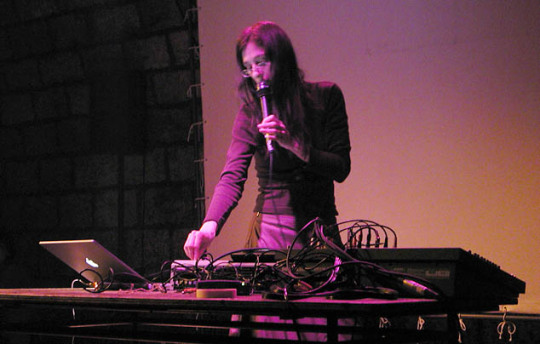
Antye Greie-Ripatti (AGF), Germany
http://antyegreie.com
#agf#antye greie#antye greie-ripatti#music#musique#electro#electronic music#musique électronique#voice#voix#πwcm7
1 note
·
View note
Photo
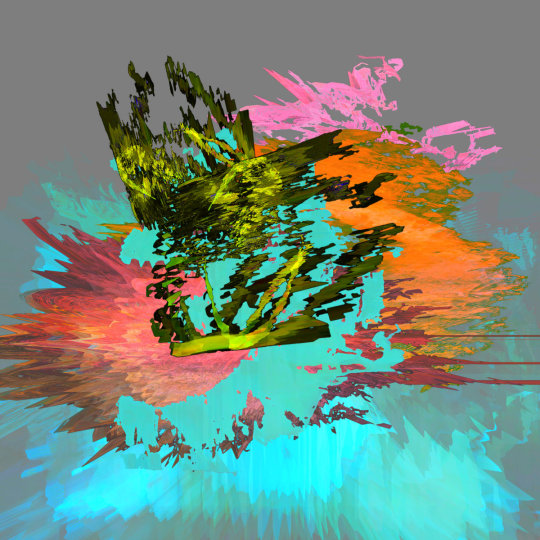
uttu EP by AGF
AGF - uttu EP
Huge, powerful, goddess-summoning anti-beats from Finnish sound artist Antye Greie-Ripatti. Fierce, abstract sound design otherworlds you’ve got to hear. -Kris
1 note
·
View note
Text
Week 4: 20th Oct: Antye Greie
I related to Antye Greie's work as she brings the inseparable collaboration between art and politics into her sonic art expression.
Sound camps Sonic wild code sonic wilderness
Feminism uncovering forgotten women in sound
Improvisation piece wanted to make something rhythmic
Line of women in the rice field 2018 lovely gentle noises cricket, bell and other sounds textures and tones. Filmed this piece then performed it later live on stage. She wrote a few chapters about sonic interventions and sonic wildness.
On vimeo
“treeing”Hanoi vietnam 2019 middle of city meditating around an ancient tree
She has done 20 masterdome improvisations
Did a
Blueberry sonic experience aking recording equipment out of mushrooms and other forages
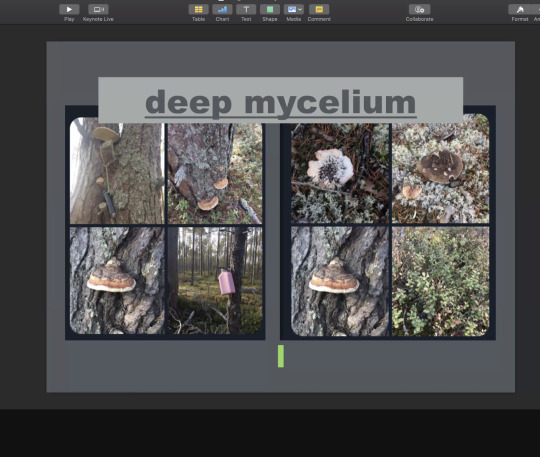

Moving away from growing frequencies apart growing
Using frequency improvisation links this to buddhism 2016 piece got people to use voice and body.
below she did a political art piece by applying female pressure and awareness and solidarity campaign for the cantons of Rojava in northern Syria
Antye Greie-Ripatti aka AGF has curated a female:pressure campaign called #Rojavato raise awareness and show solidarity to the cantons of Rojava, in northern Syria. Hoping to promote social, racial and ethnic justice, gender, religious freedom, ecological principles.
3.
Ryoko akam 2013
Went to a nuclear power plant making a spell to bewitch this place. she then moved onto introduce feminism and intersectional space and identity.

Her piece sound suspension a rerun of her walk
Methods of gathering people
Critical body Kubra Khdemi Afghan woman
Intersectional feminism inequality between women, passports, women and sexuality, women and class, women and LGBTI issues. women and race.
Conditions, legal rights, sonic concepts were using bodies in space, holding,
Human noise
Humming. How to collaborate or interact from a privileged position how can we help, she asked the audience hoe can we help, how do we tackle these inequalities
Microphones
Worked with contact mic she ran over their body, the mic doesn't care about gender, sex
The colour of skin. The collective humming intervention
She is working on an idea below Position, Composition and sound


Build space called recon.org to commission on this site
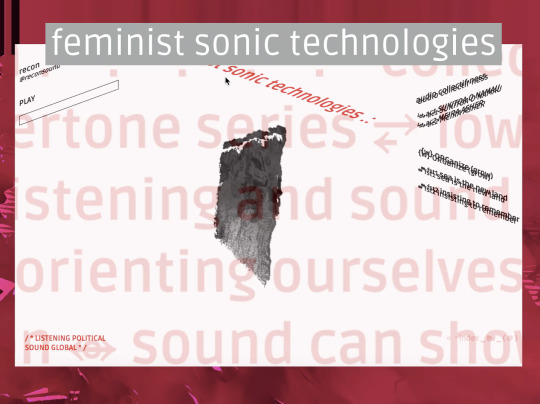
A layered embodied experience
In opposition to her and her desire to expose everything she is interested in
Female pressure eclectic indigo vienna 3000 off social media network
Campaigned for visibility, gender sex studies to try and change sound field
In terms of gender
Antye Greie interviewed Lastesis about their performance and sound.
"What began as a crowd of blindfolded women chanting in the Chilean port of Valparaiso* turned into a global movement to fight domestic and institutionalized sexual violence."

Women fighters in sierra
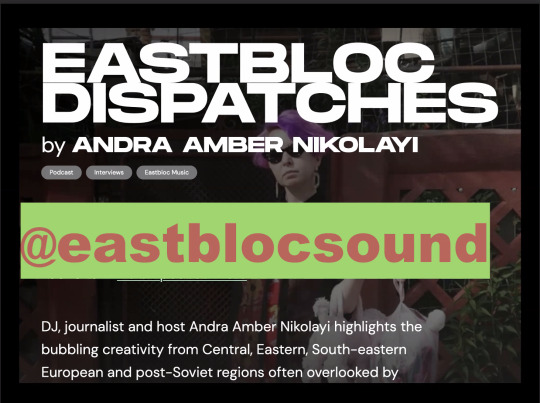
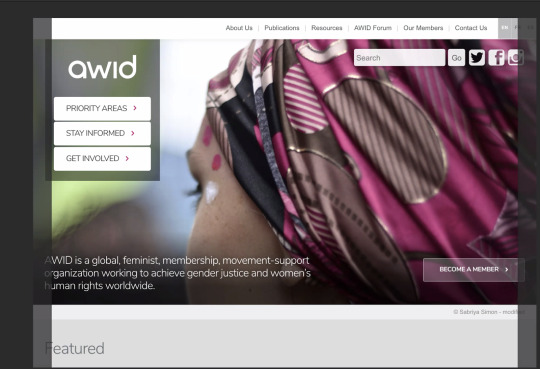

#l̊i̊s̊t̊e̊n̊ to rec-on.org archive#direct links -> quick access to all episodes#https://rec-on.org/index-sitemap.html#NEW#landbacknowledgement#https://rec-on.org/landbacknowledgment.html#↹ audeƒenze#AGF & Porya Hatami - Sanandaj#Iran#https://rec-on.org/audefenze.html#FEMINIST SONIC TECHNOLOGIES#feministsonictechnologies#https://rec-on.org/feministsonictechnologies.html#!!! strike/ huelga/ streik/ lakko!#with aylu & agf feat. Constanza Castagnet#Buenos Aires#Argentina#https://rec-on.org/STRIKE!.html#↟ BaTonga Exist#by Lindatumune Nyono Mudimba#rural Zimbabwe#https://rec-on.org/BaTongaExist.html#⟳ SOIL MAtris{x} ⥰⥰⥰#Women defend the earth#by Aly Cabral#Manila#Philippines#https://rec-on.org/soilmatrix.html#+ reader: https://rec-on.org/pdf/fst07_SoilMatrix__AlyCabral_reader.pdf#✦ JIZINGATIE MWENYEWE
0 notes
Text
A list of my releases 2021
I would like to thank everyone who have been supporting my music. I had luckily the most productive year ever and thus I put down a list of my all releases I had throughout this year to look back and to be thankful for having chances to present full of music.
Keep looking forward to what is coming in next year - till then I wish you all a happy new year for 2022.
- Solo album
Midori Hirano - Soniscope (Dauw)
Format: LP & Digital

- Collaborations
Atsuko Hatano & Midori Hirano - Water Ladder (Alien Transistor)
Format: LP, CD & Digital

Oh No Noh + Midori Hirano + Jo David Meyer Lysne - Distant Sediments (Teleskop)
Format: Cassette & Digital

- Remixes
Pascal Schumacher - Re:Lift - Resonating Pulse (Midori Hirano Remix) (Neue Meister) - Digital
Ginevra Nervi - Gaslighting (Midori Hirano Rework) - Digital
Ceeys - Im Fenster (Midori Hirano Rework) (Neue Meister) - LP & Digital
Foam and Sand a.k.a. Robot Koch - Circle 19 (Midori Hirano Rework) - Digital
Simon Goff - Vale (Midori Hirano Rework) (7k! Music) - Digital
- Single
Midori Hirano - Kioku (INNI) - Digital
- Compilations
Monika Werkstatt - “M-Session” (Moabit Musik / Monika-Enterprise) - LP, CD & Digital *Cover album for Malaria!, Matador and Mania D. with Gudrun Gut, Pilocka Krach, Beate Bartel, Mommo G, Lucrecia Dalt, Antye Greie-Ripatti, Natalie Beridze, Sonae, Islaja & Annika Henderson
Uto'pians (Vol.2) (Blue Spiral Records) - Digital
Imaginal Soundtracking 2: 鬼 / The Demon (Phantom Limb) - Digital
Compilation Three (First Terrace Records) - Cassette & Digital
Fieldwave, Vol.2 (Nonclassical) - Cassette & Digital
- Compositions commissioned by Heroines of Sound Festival
“Forests and Tides” for Lange//Berweck//Lorenz
“Distant Symphony” (to be released in 2022)
1 note
·
View note
Video
vimeo
sonic loneliness from Antye Greie-Ripatti on Vimeo.
for Ars Electronica 2020 #soncwilderness without others
0 notes
Video
vimeo
Vladislav Delay @ Unsound 2019 visuals AGF from Antye Greie-Ripatti on Vimeo.
follow VD -> vladislavdelay.bandcamp.com/
0 notes
Text
“German composer Antye Greie-Ripatti, or AGF, speaks passionately about the internet - unsurprising for an artist who engages with technology as she does. Her 2002 debut album HEAD SLASH BAUCH played with translating HTML and software handbooks into poetry and pop. She had an ‘artist’s page’ set up without her consent some years ago, and hasn’t used Facebook for her work since. Most of her criticisms of Facebook stem from the lack of user agency and individual privacy, but she also laments the homogenising force of the platform: "I have my own website and I really liked exploring my own ways of communicating online. For example, I have a poem newsletter and people can subscribe to my poems. A few times a year, I them out to everybody, and that is my own way of communicating - to make something social, but not in a huge, marketing way."
Her absence from Facebook has had an effect. "I’ve lost a lot of business, but I'm still online, people can find me - Soundcloud, Bandcamp and Vimeo. No Gmail, no Youtube. I'm not a commercial artist - I do my stuff, and I'm super lucky and happy that I can."
Techno artist Rrose also chose not to have a Facebook page, but a fan created one and then asked them to take it over. They use it mostly for show announcements, and they’re frustrated by the pressure to boost posts, the loss of intimacy and the efforts to monopolise - information about events listed on the platform can’t easily be viewed by anyone outside Facebook. “They want to be the only way to communicate,” says Rrose. “They want to control people's experiences on the internet.”
Like AGF, Rrose laments the loss of quirky or innovative modes of communicating, but their issue always comes back to marketing: “When you log in to an artist's page, Facebook gives you suggestions on how to 'improve' your 'performance'. They give you tools and tips which make it look like they're trying to help, but it’s just pushing you into this marketing mindset. I find myself caring about the response to a post, when I don't want to. I want to focus on my music - that’s how I make a connection to the audience, first and foremost."
This bears some similarities to the sentiment of Vladislav Delay, who had around 10,000 'likes' and plenty of traffic on his Facebook page but found that the voyeurism made him uncomfortable and he left the platform.
But Vladislav Delay and AGF both started making music in the 90s - they were established before Facebook even existed. Rrose started releasing music much later, in 2011, but it was through the well-established and highly influential Sandwell District label, and before its monthly users had shot up to more than two billion. It’s reasonable to argue that these artists had their careers develop before Facebook's reach expanded this far.
For more recently emerging artists, things are different. I spoke to Hunni'd Jaws, the Berlin-based DJ and producer known for her boundary-shattering mixes. She hosts Call Dibs on Berlin Community Radio with Dis Fig. Hunni'd Jaws tells me that having a Facebook page felt necessary once she started to take her music seriously, and that it has put pressure on her in a number of surprising ways. For example, to keep her 'message rating' high, she needs to respond to all the messages she receives, even though sometimes they're weird requests or inappropriate messages from strangers. She finds FB and Instagram useful for sharing flyers, mixes and compilations but she also describes the pressure of being on so many platforms simultaneously as "overwhelming" and annoying: "I just changed my profile in Instagram to make it more business-y and to see what's reaching people. I don't want to be posting lots of selfies, but those get the most likes. I'd rather not get attention through that. I wish that my 'followers' would hear the music I'm producing, but of course it doesn't work like that."
Of the artists that I speak to, Hunni’s Jaws is the only one who brings up Facebook’s supposed first and foremost function: making new connections. Facebook has allowed her to meet likeminded artists and DJs in other parts of the world and forge new connections. Hunni'd Jaws is a co-founder of the No Shade collective alongside Linnéa, Carmel Koster, and Polymaze. They offer a tutorship programme for new female and non-binary DJs, which culminates in a paid gig at their partner venue, ACUD Macht Neu. The initiative began as a Facebook group, and as the project has developed they’ve continued to use Facebook to network and reach new future-DJs. Similar initiatives by collectives such as Siren also use the platform for organising and promoting; smaller nights and collectives with similar aims, like London's BBZ, use social media rather than setting up their own websites.
But on Facebook, artists’ pages need to pay to be promoted, and artists have to work out if this is viable or worth it. William Osiecki and David Mitchell run the Stack Your Roster label and collective together. “In 2013 we 'boosted' a post on our Facebook page,” says Osiecki. “That was the only time we tried that. It did so little I decided it wasn't a worthwhile expense for our little label that doesn't even turn profit anyway."
Of course, many musicians and artists face financial struggles. For those trying to make a living through their creative work, to lose exposure by leaving Facebook would be too great a risk. “But these platforms only offer you free access to their networks because your participation is where their profits come from,” says Osiecki. “Paying Facebook amounts to an approval of their dangerous centralisation of internet traffic. It's been difficult [to gain traction without using it], but I don't think Facebook is particularly useful for reaching people.”
He continues: “We’re compelled to feel that we can't function without it, then it becomes our only source of information, where we don't even control our own newsfeeds. It's ruining local newspapers and journalism […] I don't want a megacorp deciding what I do and do not see. That's obviously dystopian, right?"
But for those who operate on a slightly more commercial plane, Facebook is key. Osiecki’s SYR co-founder, David Mitchell, is in a math-rock band Gulfer: "Facebook has always been the most important social network for us. It's the only one that other members of the band actually post on or look at, and it has always been our more official outlet for news and announcements. We are incredibly reliant on it not only to disseminate information but also as a source of validation, through likes and so on."
The Quietus has its own problems with the platform - ad revenue has been decimated as businesses focus their campaigns on Facebook, and that in turn threatens the site and its support and coverage of independent and non-commercial music. At the same time, Facebook's algorithms have favoured content designed to go viral, rather than the high-quality editorial the site became known for. tQ’s Luke Turner also makes a point that mirrors Hunni'd Jaws’ experience: "Young musicians are expected to be active across all these platforms- it puts a huge amount of pressure on them, on how they look, on how they conform. I'm a great fan of music made by really difficult people, and I wonder if the difficult people making the brilliant art are going to be able to get through the social-media filters. Of course this leads to the other issue that in bleak times for record sales artists look to brands to earn money - are only the most photogenic and pliable going to succeed?"
How much are we willing to sacrifice, how much compromise is ‘worth it’? Musicians, promoters and publishers are caught between artistic freedom and corporate reliance and, for emerging artists trying to start their careers, the game is changing so rapidly that the answers are more slippery than ever. The once liberatory potential of the internet has dissipated into a mirror of inequality, with power massively skewed online just as it is irl. Google handles over 63% of searches (a figure predicted to rise to 80% by next year) while Facebook is apparently taking over media distribution. There are attempts to create alternatives (such as decentralised open-source network Mastodon) but so far it seems that nothing can disrupt the monolithic monopolising force that is Facebook.” - Mollie Zhang, “Slaves To The Algorithm: How Facebook Is Throttling Underground Culture.” Black Sky Thinking, The Quietus. Feb 6, 2018.
#music promotion#facebook#musicians online#musicians#the algorithm is not your friend#art in the age of the algorithm#hegemonic cultural product#new manifolds#interaction#online interaction#there is no real world#the quietus#berlin music scene#mollie zhang#underground music#underground culture
0 notes
Text
Electronic Music Compilations Must Be Inclusive
Grayson Haver Currin’s review of the new I Said No Doctors! experimental compilation takes space to point out how needlessly white and male the record is, including but a single woman and a single non-Western group in its 14-track lineup:
That the past and present of experimental sound brim with and depend on both women and people of color should be obvious enough. The potential roster for a more-balanced survey is astounding, from guitarist Mary Halvorson and harpist Mary Lattimore to pedal steel master Susan Alcorn and synthesizer legend Laurie Spiegel. Their omission here lands less like mere oversight, then, than an insulting insinuation that instrumental innovation stems only from boys with toys. For a compilation so concerned with possibility, I Said No Doctors! overlooks more than half a world of it.
Hardly “the most groundbreaking artists of current and past decades,” as the record’s press kit suggests.
This reminded me of something I had started writing about a few months ago when I learned about the reissue of DJ Shadow’s Entroducing, alongside which came Endtroducing Re-Emagined, a remix album with no women in the track listing.
Compilations and remix albums are a great opportunity to improve diversity in electronic music, and yet they’re still 99% white men. It’s unacceptable.
Remix albums and compilations often serve as artist introductions to those who haven’t heard them before, making the representation particularly important. They are efficient—in a single release, a dozen or more artists to hear about for the first time or from whom to hear something new!
I find it hard to believe not a single woman would be interested in remixing Endtroducing, one of the most the ubiquitous and canonized electronic records ever.
How about Star Wars: Headspace? Fifteen tracks, nineteen men, zero women.
Or DJ Koze Presents: Pampa Vol. 1: Nineteen tracks, twenty-one men, two women.

Or Adult Swim Singles Program 2016: Thirty-one tracks, only a third feature women.
Or Loscil’s 100 Minutes: Sixteen tracks, zero women.
Or four volumes of the Air Texture series: over a hundred tracks and only a handful of women.
There is no excuse for this; electronic and experimental music in 2017 offers a long list of women. Where are Christina Vantzou and Holly Herndon and Laurel Halo and Pharmakon and Sarah Davachi and Julianna Barwick and Maria Chavez and Noveller and Jlin and Kate Carr and Leah Barclay and Midori Hirano and Klara Lewis and Kara-Lis Coverdale and Anna Meredith and Lucrecia Dalt and Motion Sickness of Time Travel and Colleen and Kate Simko and Inga Copeland and Powder and Via App and Kaitlyn Aurelia Smith and Micachu and Empress Of? And beyond those—the few that come to mind from memory and scrolling through iTunes for a minute—where are all the women I haven’t heard of?
Not to mention the possibility of reaching into the past for pioneers like Pauline Oliveros, Laurie Spiegel, Delia Derbyshire, or Wendy Carlos, though journalist and editor Abi Bliss points out the danger of fetishizing electronic music’s forebears:
The patchbay-nun narrative of vision, isolation and belated recognition may make a neat story for reviews sections, but the retrospective celebration of such figures doesn’t prevent sexism from continuing to pervade today’s cultural organisation and consumption. Indeed, reinforcing the idea that such women are exceptional risks normalising in the minds of both promoters and audiences those present day line-ups featuring a sole female artist.
It’s not okay to have no women in your lineup—on record or on stage— and it’s not enough to have them in the single-digit percentages. We’ve got work to do.
Some further reading:
Philip Sherburne’s ‘EDM Has a Problem with Women, and It’s Getting Worse’ and Angus Finlayson’s ‘Lesbian Propaganda & Other Myths: Misogyny in Dance Music’ point to the rampant misogyny of dance music culture and how it exacerbates the exclusion of women therein.
female:pressure is a great blog pointing to efforts to increase diversity and inclusion in electronic music.
@feminatronic is a Twitter feed featuring women making electronic and experimental music. Lots and lots of it.
Many Many Women is an index of women electronic and experimental musicians.
Synthtopia’s ‘40 Years of Women in Electronic Music’ and NERDGIRLS - herstory of electronic music by Antye Greie-Ripatti are both great overviews of the women pioneers of electronic music’s history, and Open Culture’s Seven Hours of Women Making Electronic Music (1938–2014) is a good listening accompaniment.
Bandcamp Daily has been doing a great job highlighting women producers, among other extremely important vectors of diversity and inclusion.
2 notes
·
View notes
Text
Poemproducer
comissioned artist bio for AGF
German artist AGF aka Antye Greie-Ripatti is a sonic warrior and electronic music producer. Her music inhabits an augmented space where pounding experimental techno, spoken word, abstract video art, feminism and radical ecology create a self-sustaining environment. Originally from East Berlin, she started to develop a DIY approach early on, while also using her voice to fight against oppression by supporting marginalized communities and calling out injustice, most recently through female:pressure, a support community and promotional platform for female-identified electronic musicians. Currently based in Northern Finland, Antye founded the local arts organization Hai Art in Hailuoto. Since its inception in 2011, Hai Art has been involved in numerous sound-related projects, focusing on media arts with children. Antye acts as its director, curator and a workshop instructor. Active since the early 90's, she has collaborated with strong names in electronic music such as French pioneer Eliane Radigue, German legends Gudrun Gut and Ellen Allien, British avantgardist Kaffe Matthews, Finnish IDM treasure Vladislav Delay and classical composer Craig Armstrong. Antye Greie-Ripatti, better known as AGF, uses electronic music as her medium to express her love for poetry, nature, new media art and strong female figures. A self-described poem producer, she courageously walks the thin line between music, contemporary art and activism. Antye (or Agee, as friends call her) grew up in East Germany and witnessed firsthand the fall of the Wall and the rise of techno culture. As a teen, she directly experienced the crumbling of dictatorship and took Philosophy courses at Bauhaus Dessau, which lead to her questioning her Marxist upbringing. In the German macho white hetero techno scene of the early 90's, men were banishing vocals from the club, insisting on not expressing emotion. Antye, on the other hand, rebelled against the trend by incorporating spoken word and poetry within her rough, techno sound. Her curious nature and mercurial spirit allowed her music to expand beyond the confines of traditional beat making, into the realm of sound art, poetry, video, performance and activism. Twenty years, some awards and collaborations later, she is still fighting to get women the visibility they deserve, whether with online platform female:pressure or by collaborating with risk-taking artists such as Afghan refugee Kubra Khademi. Active for over 15 years, female:pressureis for electronic music what Guerilla Girls was for contemporary art. Their charts breaking down the glaring inequality of male and female artists in music festivals have reached internet art status. Antye lives on an island in Northern Finland, records sounds in the woods, posts poems via twitter and through a poem newsletter one can subscribe on her website. In 2011 she founded the arts organization Hai Art in Hailuoto, where she activates as director, executive producer , workshop leader and independent sound curator. Over the years, Hai Art has organized numerous conferences and art residencies, mainly focusing on programs dedicated to children. They developed projects such as the iPad Orchestra Hailuoto, built an acoustic sculpture The Hailuoto Organum in public space, facilitated a children MediaLAB and numerous sound art camps. Her work is constantly expanding into new territories, most recently incorporating radical mycology, performance art and radio work.
0 notes
Video
vimeo
AGF: greim69 feat. Marlene Dietrich from Antye Greie-Ripatti on Vimeo.
A song is never finished, only abandoned! To promote my new album Kon:3p>UTION to: e[VOL]ution I made this clip with the opening song greim16 featuring all scenes with Marlene Dietrich from the film "Shanghai Express". (btw the film passes the Bechdel test, my total admiration for Joseph Sternberg here) If you enjoyed the work I would be very grateful if you spread, donate or buy my album on bandcamp: agf-poemproducer.bandcamp.com/album/kon-3p-ution-to-e-vol-ution
appreciated, yours poetess
PS: headphones play bass!
antyegreie.com poemproducer.com @poemproducer on twitter
1 note
·
View note
Audio
RyJ is a current collaborative project of Vladislav Delay and Antye Greie-Ripatti. work-in-progress studio mix based on material to be released on Ripatti in 2014. more by RyJ: https://soundcloud.com/ryi2012/ryj-minajmix
0 notes
Audio
RyJ studio mix (December 2013) by Vladislav Delay http://ift.tt/JqBwfp
0 notes